#Like Heliogabalus?
Text
OKAY so I read "The Caesars" by emperor Julian and y'all, if you love Lucian's satires this is absolutely for you.
Here are some of my favorite parts from it:
A quick summary: Romulus (who has now attained the status of a god, like Heracles) once hosted a Saturnalia and invited the Greek gods and the Roman emperors to the banquet. A contest between the Roman emperors ensued, with Alexander the Great called in as an extra contestant upon Heracles' request.
Silenus is the star of the show, doing most of the jesting. But I really like the way his bond with Dionysus is highlighted
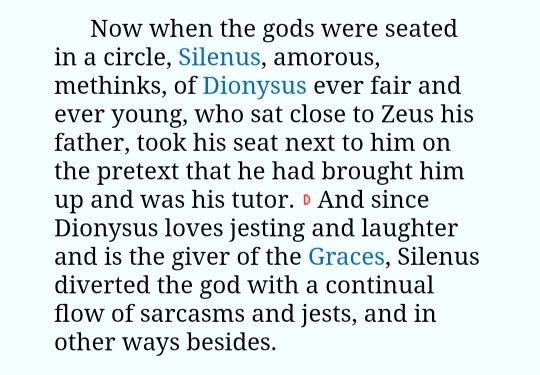
And it's no joke, he really does roast these emperors till they're sizzling lol starting with Julius Caesar himself:
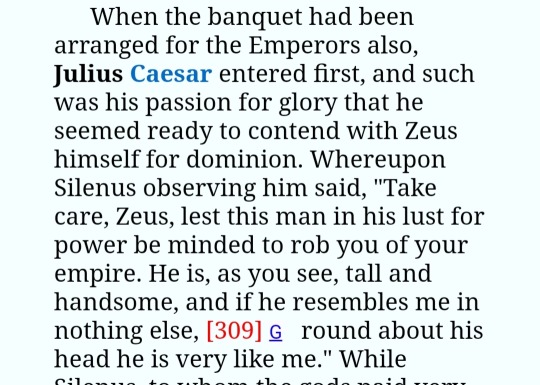
Next comes Augustus Octavius, whose entry is so pretentious and pompous that it becomes repulsive
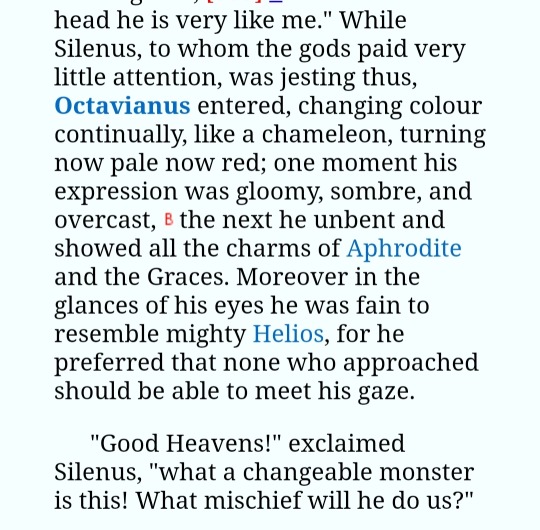
Apollo gets a bit defensive over his "nursling" (a nod to the belief that Octavius was actually Apollo's son) and goes *insert Barbie meme "it's really not that bad! it just needs a little... shaping. To the salon!!"* ft Zenon the Philosopher who casts some spells of philosophy to make Octavius less obnoxious
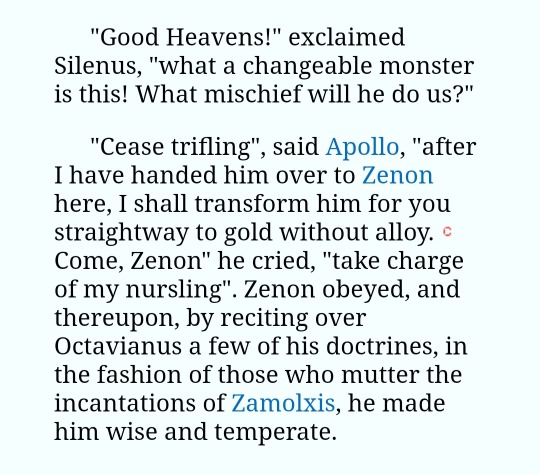
And it works because Octavius is mostly humble and well mannered for the rest of the day lol
Heracles grabs this opportunity to fanboy over Alexander the great.
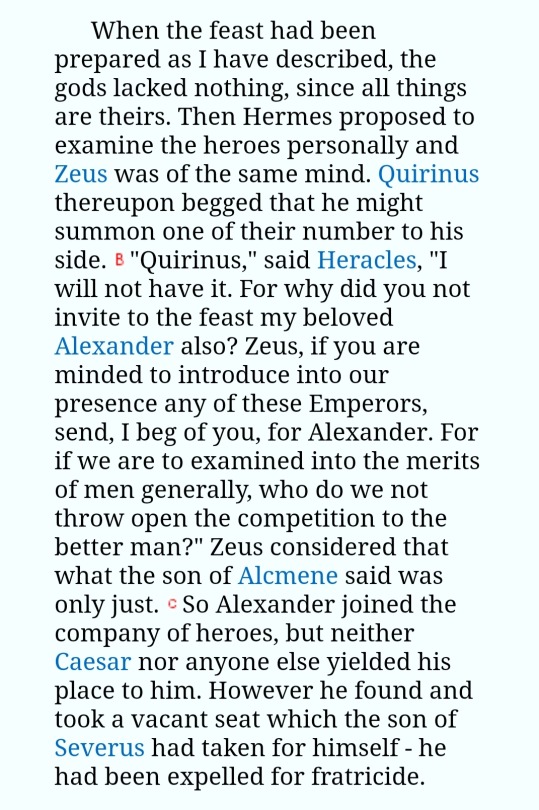
Like, "my beloved Alexander"?? It's cute when the gods gush over their mortal descendants.
Now, a shoutout to the emperors who didn't even get a chance to sit in the assembly because they were the worst of the lot apparently. We have:
Caligula, so terrible that the gods didn't wanna even look at him and he straight away was sent to Tartarus
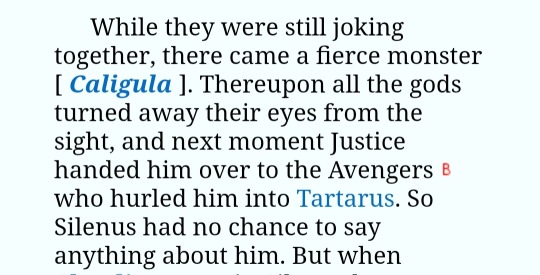
Nero, who tried to be an Apollo wannabe and promptly got taken to the underworld
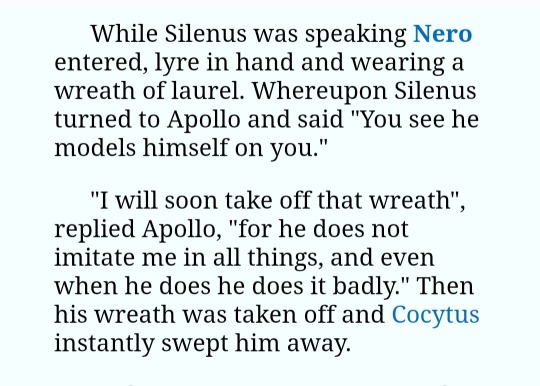
Commodus, whom Silenus didn't even bother to roast (and he tripped and fell anyway, what a loser)
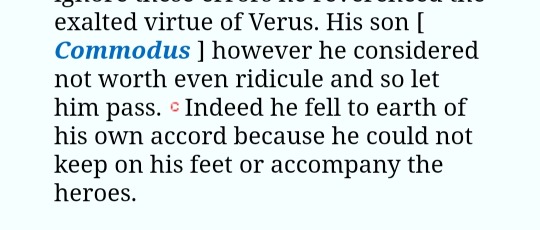
There are more but these were the funniest
Anyway, the gods decide on how to choose the best amongst the Emperors. Apollo and Hermes have differing opinions on this, but Zeus decides to entertain the suggestions of both of his sons :3 (finally, one instance where he treats Apollo and Hermes equally)
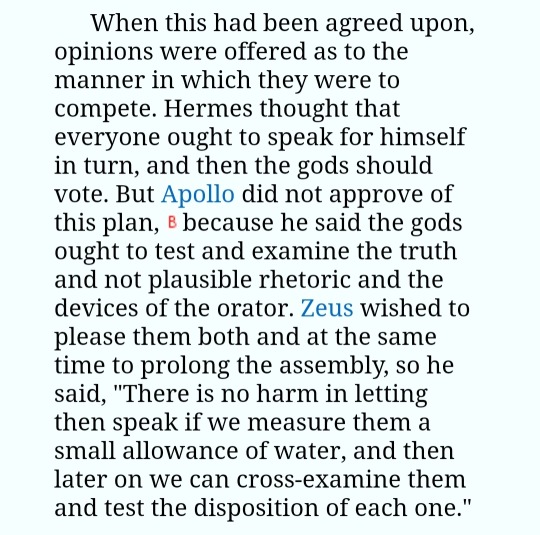
All the emperors talk about their achievements first, then Hermes cross examines them to see if their motives were worthy enough and oh boy, it does not go well for Alexander who is brought to the verge of tears by Dionysus lmaooo
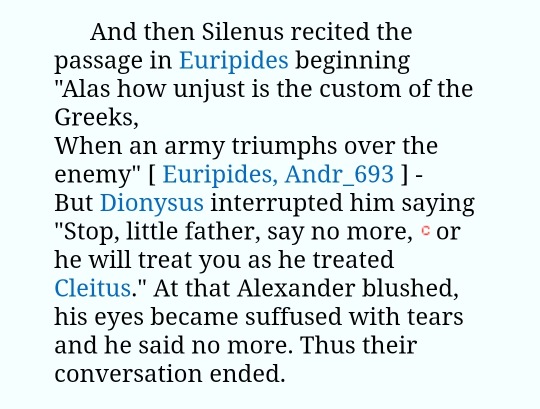
Anyway, in the end the gods vote and Emperor Marcus Aurelius wins the contest. But after that, Zeus asks each emperor to choose a god to spend the rest of their evening with
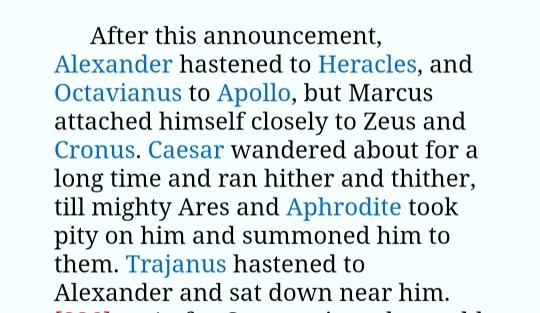
Ares and Aphrodite kind of just adopt Caesar LOL and yes, Cronus is present, sitting beside Zeus, with Rhea and Hera also sitting with them. He is the one who nominates Marcus Aurelius.
but here's the most crack part of this whole thing:
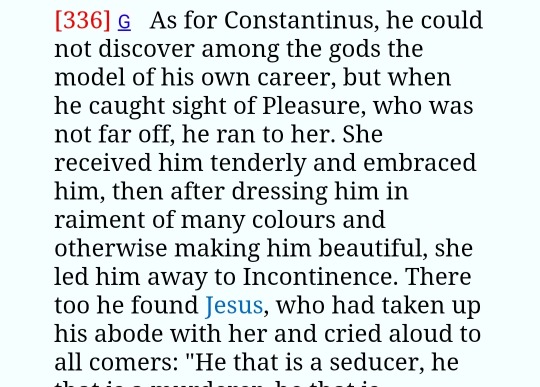
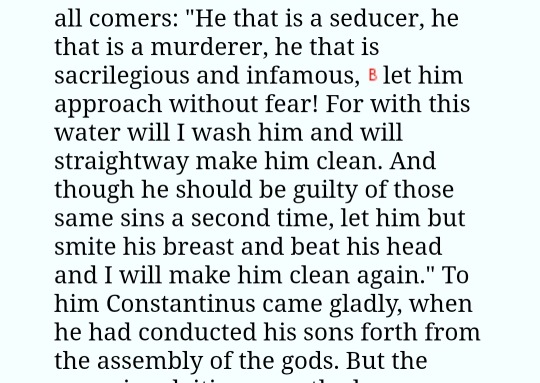
Like who invited Jesus bro skdjsndn 😭
Anyway, the story ends with Hermes giving some generic advice to the author, Emperor Julian and ending the story. Also, Julian lets us know that this whole story was told to him by none other than Hermes himself, and gives a disclaimer that he doesn't know if it's is true or just a lie fabricated by Hermes, or a mixture of both LMAO
Here's the link PLEASE READ THE ENTIRE THING
#Kronos#Zeus#Dionysus#Silenus#Apollo#Hermes#some jokes and roasts I did not understand because I am really not well versed with these emperors#and the many atrocities they've committed#but this made me more interested in digging into the Roman empire than anything else#Like Heliogabalus?#Absolute madlad#I should have known about him sooner#Anyway#Even if you just like seeing Greek gods hang out and have a nice family chat#You will really enjoy this#Emperor Julian#The Caesars
49 notes
·
View notes
Text

progress pic!
#i like that it's a little crooked but i might move things around a little before i'm completely happy#not now though. hot. thunder coming i hope.#annoying thing: had to move the roses of heliogabalus but for now idk where#my home
17 notes
·
View notes
Text

The Roses of Heliogabalus (detail), Sir Lawrence Alma-Tadema, 1888
#Sir Lawrence Alma-Tadema#The roses of heliogabalus#1880s#1880s art#fine art#romatic#roses#pink roses#late victorian era#victorian art#late victorian art#romatic academia#this feels like shitposting given the subject matter#'unpopular painter creates image of unpopular emperor's lavish and irresponsibly luxurious banquet'#*or empress' lavis and irresponsibly luxurious banquet!#it's hard to tell when the person in question has been dead for more than two millennia and was also systematically erased from history#and was also unpopular enough that people might be incentivised to lie#and roman historians were by and large full of shit anyway#(no such thing as an unbiased account of history? sure#but roman historians didn't even fucking try like c'mon guys)#not that later historians were any less shitty about her#also alma-tadema is the epitome of ~aethetic~ and i for one truly appreciate that
5 notes
·
View notes
Note
i always read your name as girlieogabalus
well he was a girlie after all
#btw u just made me realize the url should probably be heliogabalus. its lacking the h#im just so used to saing eliogabalo sdjfhs im not gonna change it tho i like how it looks#asks#saying*
2 notes
·
View notes
Text
My favorite Roman emperor is our girl Heliogabalus simply because I find her the most interesting to read about.
Ya never really know what someone means when they ask you to name a "favorite" Roman emperor. Do they mean the nicest guy? The least incompetent administrator? Cuz as far as I can see they were more or less all rotten bastards and most tended to be not especially good at their jobs either. And that's easy to say about your Neros and your Caligulas and dudes like that, but it goes for the "good" ones too. Like Trajan and Hadrian are often held up as good'uns but they were each so committed to the pursuit of ethnocide that it's often debated whether Trajan or Hadrian ought to be the guy to blame for the Jewish diaspora. And good ol' Marcus Aurelius tried his very best to do two ethnocides during the Marcomanic Wars; they ain't put that part in Gladiator. Maybe this ain't politically correct or whatever of me but I just don't think that to be sound foreign or domestic policy. The attempted ethnocides, I mean.
And if we're gonna put our critical faculties aside and do that thing where we act like silly Romantics and talk about history like it was sports, in that case I think it's just swell when empires collapse and I'm not particularly upset about the triumph of heathen barbarism over Christian civilization, so we're out of that game as well.
So, my "favorite" Roman emperor needs must be the one who's never, ever boring, b/c that's the only thing the question could mean to me.
Also, I think Heliogabalus gets a raw deal from chroniclers and later historians cuz if we're really gonna do the devil's calculus and sit here talking about who killed more people than who, she and Antoninus Pious are probably tied for who racked up the lowest body count and ruined the least lives. It's not zero, but it's at least a few dozen thousand lower than the mean.
183 notes
·
View notes
Text
LGBT literature of the 1860s–1910s. Part 5
After a long pause, the list is back! Here we have a couple of plays, accounts by two trans women, lesbian poetry, and more.
1. Despised and Rejected, by A.T. Fitzroy (Rose Allatini; 1918). A pacifist novel published during World War One? With gay and lesbian characters? Yes, that was sure to get people in trouble. Its publisher was fined and the judge called it “morally unhealthy and most pernicious”. So, Dennis is a young composer who hates violence and therefore refuses to go to war. He also suffers because he is a “musical man”, that is, gay, and loves Alan, art-loving son of a wealthy businessman. His friend Antoinette, meanwhile, is “strangely attracted” to a woman. Nevertheless, the two attempt to love each other. When the war begins, Alan appears in Dennis’ life again, and they try to avoid being sent to the front together. Alan also persuades Dennis to accept who he is. Edward Carpenter himself defended the novel, saying that “the book is also a plea for toleration of a very much misunderstood section of humanity”.
Read online
2. Autobiography of an Androgyne, by Ralph Werther (1918). Ralph Werther, also known as Jennie June, wrote this autobiography for doctors, and it is very revealing. Being a New York fairy (male prostitute) and possibly a trans woman, they tell frankly about the city’s gay underworld of the early 20th century and their personal experience, which is sometimes too frank and dark perhaps, but all the more interesting.
Read online
3. Poems by Mikhail Kuzmin. Kuzmin was not just the author of Russia’s first gay novel, but also a poet. Many of his works were dedicated to or mentioned his lovers. I’d recommend Where Will I Find Words (in English and Russian), Night Was Done (both in English and Russian), from the 1906-1907 collection Love of This Summer (available fully in Russian), mostly based on his love affair with Pavel Maslov in 1906. And also If They Say (in English and Russian), which is a great statement.
4. The Loom of Youth, by Alec Waugh (1917). A semi-biographical novel based on Evelyn Waugh’s older brother’s experience at Sherborne School in Dorset. It is a story of Gordon Caruthers’ school years, from the age of 13 to 19, and it is full of different stories typical for public schools, be it pranks and cheating exams or dorm life and sports. Although the homosexual subject was quite understated, the author implied that it was a tradition and open secret in public schools. The book became popular and soon caused a great scandal. Worth noting that before that Alec was expelled for flirting with a boy.
Read online
5. Two Speak Together, by Amy Lowell (1919). Lowell was a famous American poet and lesbian. Many of her poems were dedicated to her lover, actress Ada Dwyer Russell, specifically the section Two Speak Together from Pictures of the Floating World. These poems are infused with flower imagery, which wasn’t uncommon for lesbian poetry of the time.
Read online
6. De berg van licht/The Mountain of Light, by Louis Couperus (1905-1906). Couperus is called the Dutch Oscar Wilde for a reason: this is one of the first decadent novels in Dutch literature. It is also a historical one, telling about a young androgynous Syrian priest Heliogabalus who then becomes a Roman Emperor. Homoerotism, hedonism, aestheticism: Couperus creates a very vivid world of Ancient Rome. He also covered the topic of androgyny in his novel Noodlot, which was mentioned in Part 3 of this list.
Read online in Dutch
7. Frühlings Erwachen/Spring Awakening/The Awakening of Spring, by Frank Wedekind (1891, first performed in 1906). This play criticized the sexually oppressive culture prevalent in Europe at the time through a collection of monologues and short scenes about several troubled teens. Each one of them struggles with their puberty, which often leads to a tragic end. Like in The Loom of Youth, homosexuality is not the central focus of the play, but one character, Hänschen, is homosexual and explores his sexuality through Shakespear and paintings. The play was later turned into a famous musical.
Read online in German or in English
8. Twixt Earth and Stars, by Radclyffe Hall (1906). Though it wasn’t known to many at the time, these poems were dedicated to women, some to Hall’s actual lovers.
Read online
9. The Secret Confessions of a Parisian: The Countess, 1850-1871, by Arthur Berloget (published in 1895). This account is similar to the Autobiography of an Androgyne, albeit shorter. The author nowadays is thought to be a trans woman. They describe their love for women’s dresses, the euphoria from wearing dresses, makeup and wigs, the life as a “female impersonator” in Parisian cafe-concerts, and their love affair with a fellow prisoner. The autobiography is not available online, but you can read it in Queer Lives: Men’s Autobiographies from Nineteenth-Century France by William Peniston and Nancy Erber.
10. At Saint Judas’s, by Henry Blake Fuller (1896). This is possibly the first American play about homosexuality. It is very short. An excited groom is waiting for his wedding ceremony in the company of his gloomy best man. They are former lovers, and this short scene is not going to end well…
Read online
Previous part is here
#lgbt literature#lgbt fiction#queer history#queer fiction#lesbian literature#russian literature#gay literature#gay history#spring awakening#lesbian history#blog: history#blog: literature
261 notes
·
View notes
Text
There's Something About Movies is a fucking fever dream of cringe humour, gay jokes, and Michael Sheen. There go the next few days of my life, I guess!
It's a total cornucopia of content. I'm feeling unwell.
It's a movie based game show with recreating scenes and everything. David Tennant is in the last episode. What a joy for a cringefail movie lover like me.
Some episodes have Jennifer Saunders as Sheen's counterpart. Just let me die already. I'm feeling like Caligula rn. Like Heliogabalus even.
80 notes
·
View notes
Text
THIS DAY IN GAY HISTORY
based on: The White Crane Institute's 'Gay Wisdom', Gay Birthdays, Gay For Today, Famous GLBT, glbt-Gay Encylopedia, Today in Gay History, Wikipedia, and more … March 11
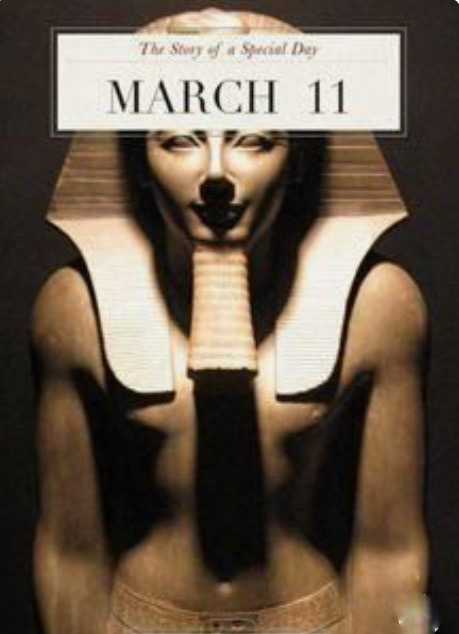


222 AD – Heliogabalus aka Marcus Aurelius Antoninus, Roman Emperor, Died (b. c.203 AD); Heliogabalis, also known as Elagabalus, the boy emperor of Rome, appears to have been a total madcap, if not completely mad. His great love of swishing ceremony can only be suggested in the space available here.
Since even madcap Gay Roman emperors were expected to produce an heir, a suitable bride was chosen for him, and he went through with the motions of consummation, finding it all rather futile. But he was impressed with the ceremony itself and later went through it twice in one night, choosing as his "husband" a well-hung charioteer named Gorianus, and as his "wife" a boy named Hierocles. His wedding night with both was consummated in full public view. The Augustan History claims that he also married a man named Zoticus, an athlete from Smyrna, in a public ceremony at Rome. He lavished favours on courtiers popularly assumed to have been his homosexual lovers.
Cassius Dio reported Elagabalus would paint his eyes, epilate his hair and wear wigs before prostituting himself in taverns and brothels, and even the imperial palace:
Finally, he set aside a room in the palace and there committed his indecencies, always standing nude at the door of the room, as the harlots do, and shaking the curtain which hung from gold rings, while in a soft and melting voice he solicited the passers-by.
Herodian commented that Elagabalus pampered his natural good looks by wearing too much make-up. He was described as having been "delighted to be called the mistress, the wife, the Queen of Hierocles" and was said to have offered vast sums of money to the physician who could equip him with female genitalia. Subsequently, Elagabalus has often been characterized by modern writers as transgender, most likely transsexual.
He had the makings of a great theatrical producer and virtually invented the casting call by sending out his agents to round up for audition the men with the largest penises in the Roman empire. Eventually his enemies dispatched him with a sword up his bum and dumped his body in the sewer. He was just 18.

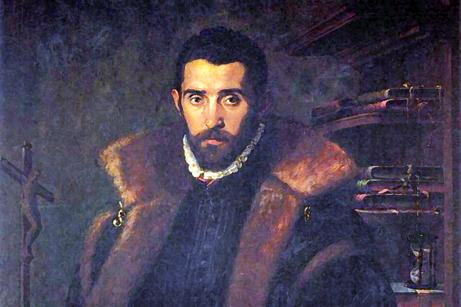
1544 – Italian poet Torquato Tasso was born on this date (d. 1595). Best known for his poem La Gerusalemme Liberata (Jerusalem Delivered) (1580), in which he depicts a highly imaginative version of the combats between Christians and Muslims at the end of the First Crusade, during the siege of Jerusalem. He died a few days before he was due to be crowned as the "king of poets" by the Pope. Until the beginning of the 19th century, Tasso remained one of the most widely read poets in Europe.
In the autumn of 1576 Tasso quarrelled with a Ferrarese gentleman, Maddalo, who had talked too freely about a same-sex love affair; the same year he wrote a letter to his homosexual friend Luca Scalabrino dealing with his own love for a 21-year-old young man Orazio Ariosto.
His poems barely hint at his homosexuality but his letters written to one Luca Scalabrino are very plain about his love of men. Here's a taste from the translated letters by Jill Claretta Robbins in the Columbia Anthology of Gay Literature:"You Lordship, in your last letter you ask forgiveness of me for not having revealed your sexual desire for me; and in your other ones that you wrote to me before, you have always shown that you believe that I am scornful of you, because you have not revealed to me this carnal desire of yours, and you express a very good reason for your secrecy and silence used with me....speak no longer of these things....In sum, I am all yours."
He suffered from what was most-likely schizophrenia, and spent several years in a madhouse. He died at age 51, having created his best work before he was 30.

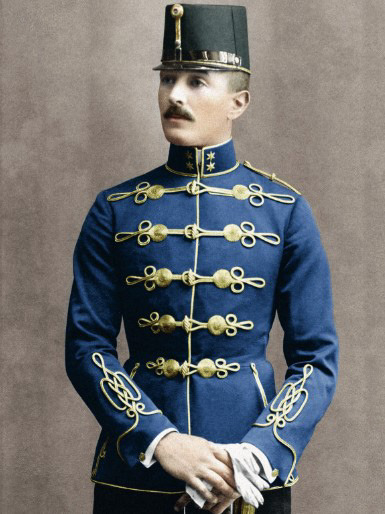
1778 – Lt. Gotthold Enslin is the first recorded U.S. soldier to be dismissed for homosexuality.


1938 – Hans-Joachim Müller, born in Bitterfeld, Germany, is a German historian who specializes in the academic analysis of the persecution of homosexual men during the Nazi era.
Little is known about Müller's career. In 1959 he moved to West Berlin, studied in the Federal Republic and returned to West Berlin with the "teaching qualification for the intermediate level".
Later he belonged to the "Homosexuality Discussion Group" of the Protestant Church in Berlin-Brandenburg , in which persecution under National Socialism, not only of homosexuals, was an important topic.
Since 1984 he has been committed to the recognition of homosexual men as victims of National Socialism. During this time he began researching the history of gay men in sub-camp brickworks .He made his long-term research on the history of the previously taboo group of victims of homosexual men in Sachsenhausen concentration camp public for the first time in 1992.
He was one of the initiators of the first memorial event for homosexual prisoners at the Sachsenhausen Memorial. Joachim Müller worked at the Schwules Museum in Berlin and was a member of the international advisory board of the Brandenburg Memorials Foundation from 1993 to 2001 . At the suggestion of the Foundation, he was awarded the Cross of Merit 1st Class of the Federal Republic of Germany for his services on April 5, 2013.


1963 – David LaChapelle is a photographer and director who works in the fields of fashion, advertising, and fine art photography, and is noted for his surreal and often humorous style.
David LaChapelle was born in Fairfield, Connecticut and lived there until he was nine years old. Then he moved to North Carolina with his family, where they lived until he was fourteen. He was bullied in his North Carolina school for being gay. When he was 15 years old, he ran away from home to become a busboy at Studio 54 in New York City. Eventually he returned to North Carolina to enroll in the North Carolina School of Arts.When LaChapelle was 17 years old, he met Andy Warhol, who offered him his first job as a photographer at Interview magazine. Warhol reportedly told LaChapelle "Do whatever you want. Just make sure everybody looks good." His photographs of celebrities in Interview garnered positive attention, and before long he was shooting for a variety of top editorial publications. LaChapelle's friends during this period included Keith Haring and Jean-Michel Basquiat.
LaChapelle has four published books of his photographs, Heaven to Hell and Artists and Prostitutes (2006), LaChapelle Land (1996) and Hotel LaChapelle (1999 featuring his vivid and sometimes bizarre portraits.
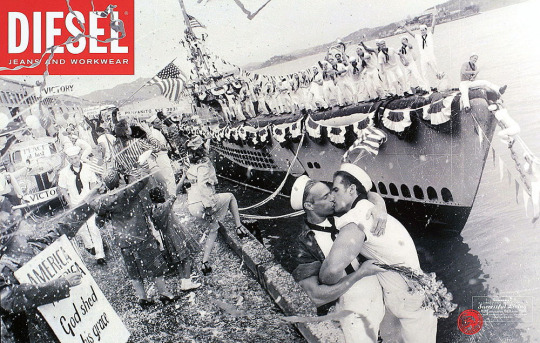
"Kissing Sailors" - Diesel Ad
In 1995 David LaChapelle shot the famous 'kissing sailors' advertisement for Diesel. It was staged at the peace celebration of World War II and became one of the first public advertisements showing a homosexual couple kissing. Much of its controversy was due it being published at height of the Don't ask, Don't tell debates in USA, which had led to the U.S. Government to bar openly gay, lesbian, or bisexual persons from military service. On a CNN interview LaChapelle admitted to being a gay escort at the age of 18.

LaChappele's gay "Last Supper"
LaChapelle directed singer Elton John's show, The Red Piano at Las Vegas' Caesars Palace, which premiered in 2004. The show features extensive use of video technology on an LED screen backing the show that, when built, was promoted as the largest and brightest of all time. Several of John's songs during the performance are accompanied by short films by LaChapelle.
He has directed advertisements for major stores. In 2006 he directed 'Romeo and Juliet', a 5 minute long commercial for H&M's new denim brand and 'Tis the Season to be Gorgeous', a humorous Christmas commercial for UK retailer Boots showing very glamourous self-indulgent women doing relatively mundane Christmas tasks. Also in the UK, he directed the surreal Lost trailers for Channel 4, which show the cast dancing in 1920s costume amongst the burning wreckage on the beach.
His directing work includes music videos for many artists. In 2006 LaChapelle was presented with the GLAAD Vito Russo Award for outstanding contributions toward eliminating homophobia
Then in 2006, the already established LaChapelle abruptly quit the scene. He moved to a "...very isolated part of Hawaii in this forest. It's off the grid, bio-diesel cars, solar-powered, growing our own food, completely sustainable. I thought 'OK, I'm a farmer now.'" LaChapelle's change in path eventually brought him back to his roots. While in Hawaii, a longstanding colleague invited him to shoot for a gallery, which he hadn't done since his days as a fledgling photographer in New York. "I was really shocked", LaChapelle recalled. "I'm so known as a commercial artist, a big name as a fashion and celebrity photographer, I didn't think a gallery will take me seriously. It's like being reborn; it's like rebirth; it's like starting over. It's back to where I started, where I very first started in galleries when I was a kid. It's just come full circle."


1967 – Today is the birthday of Scottish singer, actor, and activist John Barrowman. Best known for his role as Captain Jack Harkness in the science fiction series Doctor Who and Torchwood. Born in Glasgow, Scotland, Barrowman and his family emigrated to the U.S. when he was nine. Growing up in the state of Illinois, his high school teachers encouraged his love for music and theatre and he studied performing arts at the United States International University in San Diego before visiting the United Kingdom and landing the role of Billy Crocker in Cole Porter's Anything Goes in London's West End.
In addition to appearing in several films and television series, Barrowman has featured on more than a dozen musical theatre recordings including cover tunes found on the certified gold album Another Side (2007), Music Music Music (2008), the second Top 40 album by Barrowman to reach the UK albums and singles charts, and his self-titled release John Barrowman (2010), the highest chart rating of any of Barrowman's albums to date.
Barrowman met his partner Scott Gill in 1993 and in 2005 they registered as civil partners under British law. They do not call their relationship a marriage: "We're just going to sign the civil register. We're not going to have any ceremony because I'm not a supporter of the word marriage for a Gay partnership." Barrowman explained later: "Why would I want a 'marriage' from a belief system that hates me?" A small ceremony was held in Cardiff with friends and family, with the cast of Torchwood and executive producer Russell T Davies as guests. The pair were legally married in the state of California on 2 July 2013, following the United States Supreme Court's decision to deny an appeal to overturning California Proposition 8 in Hollingsworth v. Perry.
In 2009, Barrowman published I Am What I Am, his second memoir detailing his recent television work and musings on fame. In the book, Barrowman reveals that when he was just beginning his acting career, a Gay producer told Barrowman that he should try to pretend to be heterosexual in order to be successful. Barrowman was offended by the incident, and it made him more aware of the importance of his role as a Gay public figure: "One of my explicit missions as an entertainer is to work to create a world where no one will ever make a statement like this producer did to me to anyone who's Gay."
To this end, Barrowman is active in his community supporting the issues that matter to him most. He worked with Stonewall, a Gay rights organization in the UK, on the "Education for All" campaign against homophobia in the schools. In April 2008, the group placed posters on 600 billboards that read, "Some people are Gay. Get over it!" Barrowman contributed his support to the project asking people to join him and "Help exterminate homophobia. Be bold. Be brave. Be a buddy, not a bully." In the same month, Barrowman spoke at the Oxford Union about his career, the entertainment industry, and gay rights issues. The event was filmed for the BBC program The Making Of Me, in an episode exploring the science of homosexuality
In 1998, Barrowman was nominated for an Olivier Award for Best Actor in a Musical, and in 2006 he was voted Stonewall's "Entertainer of the Year."


1978 – Christopher Rice, American author, born; an American author. Rice has written six best-selling novels: A Density of Souls, The Snow Garden, Light Before Day, Blind Fall, The Moonlit Earth, The Heavens Rise, and his latest book, The Vines, which was published in 2014.. His parents are Anne Rice, who died recently. and the late poet Stan Rice; his aunt, Alice Borchardt, is a noted writer.
Rice is gay; when asked in 2002 about "being pegged a 'gay writer'", he replied:"That's not what I do. I might be more open to that label if I hadn't introduced ensemble casts of characters. Granted, " A Density of Souls" is as close to a gay book as you can get. It revolves around a character's homosexuality and others are described in terms of their reaction to the one character's sexuality. In that sense it's at the core of the book. "The Snow Garden" is about identity. With this book, I'm trying to shrug off the term "gay" author."
Nonetheless, Rice is proud of his large following in the gay community, explaining "it was incredibly rewarding when I got a huge positive response from the character Stephen in "The Density of Souls". More than a thousand young gay men contacted me and said that I captured what it was like for them going through those years. That means everything to me." Rice also writes a regular feature for The Advocate called "Coastal Disturbances," in which he discusses various topics and he is currently the President of the Board of the Lambda Literary Foundation.

Christopher Rice Near-naked Selfie
In 2012, Rice launched a streaming Internet radio show called The Dinner Party Show. Eric Shaw Quinn, his partner and co-host, was known for having ghost written two books by celebrity Pamela Anderson and a 1992 novel about gay adoption called Say Uncle. The show describes itself as "the Internet's first live comedy variety show" and became known for its hard-hitting satire. After a year on the air, the show dropped its run time to one hour and focused on celebrity interviews and scripted specials. Guests have included Patricia Cornwell, Dan Savage, transgender activist Chaz Bono and Tales of the City author Armistead Maupin.
In 2013, Rice made his first entry into the supernatural thriller genre with The Heavens Rise. It was nominated for a Bram Stoker Award for Superior Achievement in a Novel but lost to Dr. Sleep by Stephen King.
In 2014, Rice announced through his social media channels that he was scheduled to publish several works of erotic romance. The first of them, The Flame, was published in November 2014 as part of the 1,001 Dark Nights series.
He is now married to fellow actor/dancer Clay Thomson, and goes by the name Chris Rice-Thomson.


2010 – The direct action group GetEqual has gained attention as a result of its bold action, including civil disobedience, on behalf of the struggle for equal rights.
The organization was founded on March 11, 2010 by young activists Robin McGehee and Kip Williams. It was established to continue the message of anger and frustration presented at the National Equality March of October 11, 2009.
The National Equality March was born out of frustration with the loss of referenda on same-sex marriage and other rights; frustration with the alleged co-opting of the gay rights movement by the Democratic Party; and frustration with the failure of President Obama to fulfill the promises he made in his 2008 campaign for the presidency.
The march was called by veteran activists Cleve Jones and David Mixner, but those who responded to the call were primarily young people who had been angered by the passage of Proposition 8 in California.
Their disappointment with the loss of the campaign against Proposition 8 was compounded by their disillusionment with the Obama administration's failure to end the Don't Ask, Don't Tell (DADT) policy, to pass the Employment Non-Discrimination Act (ENDA), and to repeal the Defense of Marriage Act (DOMA).
The march attracted some 250,000 participants and featured speeches by such new activists as Academy Award-winning screenwriter Dustin Lance Black, actress Cynthia Nixon, DADT protester Lt. Dan Choi, and pop singer Lady Gaga, as well as Jones, Mixner, and civil rights icon Julian Bond.
GetEqual was founded in order to fulfill this need for assertiveness in the fight. Its mission is to empower the glbtq community and its allies "to take bold action to demand full legal and social equality, and to hold accountable those who stand in the way."
GetEqual uses the tactics of nonviolent civil disobedience of the 1960s civil rights and anti-war movements and those utilized by ACT-UP in the 1980s: sit-ins, pickets, disruptions, and a great deal of political theater.
The organization has sponsored actions that range from sit-ins in former Speaker of the U.S. House of Representatives Nancy Pelosi's office, disrupting traffic in Las Vegas and New York City, picketing the Ugandan embassy in Washington, D. C., heckling President Obama at fundraisers, to "glittering" politicians such as Republican Presidential candidates Newt Gingrich and Michelle Bachmann and, most dramatically, to chaining protesters to the fence in front of the White House.
It was the direct actions on behalf of the repeal of DADT that first brought GetEqual to national attention, especially the arrests of McGehee, Lt. Dan Choi, Captain Jim Pietrangelo, and others who chained themselves to the White House fence on several occasions, most notably in November 2010 when it appeared that the long-sought repeal of DADT would fail.
Although GetEqual has been criticized by establishment figures for its tactics—Congressman Barney Frank called them "tacky" and counterproductive—it is almost certain that DADT would not have been repealed in 2010 without the pressure applied by GetEqual through its demonstrations and civil disobedience.



20 notes
·
View notes
Note
Ahoy! 10 or 24 for the ask game?
10. I have soooo many favourite art pieces omg 😫💗
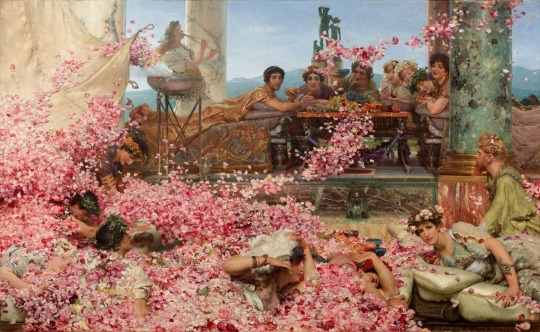
Sir Lawrence Alma-Tadema’s “The Roses of Heliogabalus”. I like it simply because it’s pretty. Like omgg look at all the details! The guy in the painting (lying down and wearing gold) is the Roman emperor Elagabalus. His story is ABSOLUTELY WILD 😨

Ilya Repin’s “Barge Haulers on the Volga.” I don’t know how to explain this one, I just love the energy it gives off!
And finally, my favourite genre is anything with cavalry charges! They always look so brave and hot but also crazy! 😍 Like, imagine riding on some creature at a crazy speed towards an enemy (with barely any kind of protection) and then proceed to smash each other’s faces with swords! How do they find the guts to do that!?!? 😳

Richard Caton Woodville Jr’s “Relief of the Light Brigade”

Nikolai Samokish’s “The Red Cavalry at Perekop”

Alphonse Lalauze’s Consular Guard’s Charge at Marengo. This one has Marshal Bessières in it!
24. Emilia Plater! I’ve already mentioned her in another post, but here’s another painting of her 💕
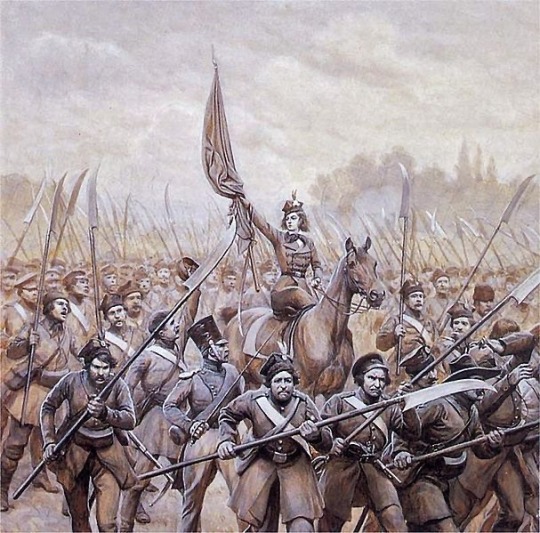
3 notes
·
View notes
Note
I'm trying to teach a friend about trans history in hopes he'll better understanding me (a mutual goal).
He's specifically skeptical about trans peoples existence throughout history.
Do you have some records of trans folks from before this century?
I think he'd benefit from something bite-sized like your posts.. which I love by the way!!
I havn't even touched the surface of trans/nonbinary/intersex people in history. It's only in the last 100 years that modern medicine has made it available so that successful surgery has been possible. I've read lots of examples of people hiding what their birth name/assigned gender is/was so they could be in the army as a man etc. Then kept that presentation until their death.
Also think about it. Before the turn of the century, technology wasn't available for information/gossip to be passed on further than local towns etc. The only people who had the means to take pictures or travel far were the rich/nobility.
Check out the following people. All have posts on Wikipedia:
Elagabalus (Heliogabalus) - 204 AD
Katherina Hetzeldorfer - Mid 1400's?
Eleno de Céspedes - Born 1545
Chevalier d'Eon - Born 1728
James Barry - Born 1789
Mary Jones - Born 1803
Andreas Bruce - Born 1808
Joseph Lobdell - Born 1829
Edward De Lacy Evans - Born 1830
Abel Barbin - Born 1838
Murray Hall - Born 1841
Albert Cashier - Born 1843
Joe Monahan - Born 1850
Charles Winslow Hall - Born 1860
Jack Bee Garland - Born 1869
Dina Alma de Paradeda - Born 1871
Jennie June - Born 1874
Piotr Włast - Born 1876
Ralph Kerwineo - Born 1876
Karl M. Baer - Born 1885
Amelio Robles Ávila - Born 1889
There may be more but I don't have time to go through all 160 pages of people tagged "LGBT History".
104 notes
·
View notes
Text
Listed: Al Karpenter

Al Karpenter was originally Álvaro Matilla (from Barakaldo). In 2014, Mattin started to collaborate with him and in 2022, Marta Sainz and Enrique Zaccagnini from Santander joined. They’ve spent the years post-COVID in a fever pitch of noise collaboration, working with fellow experimenters Sunik Kim, Dominic Coles and Triple Negative on their album The Forthcoming and with CIA Debutante on another self-titled disc. Jennifer Kelly reviewed both in August, writing that, “Al Karpenter swamps threads of song in seething banks of noise and dissonance. You find yourself focusing on blaring surface noise, while sense and melody percolates somewhere underneath.” Here Mattin picks ten boundary-pushing favorites.
El Inquilino Comunista — “Cruel Off” (1992)
youtube
This track was actually in their first tape, which for me, was probably the best thing to come out of Getxo Sound, a small noise rock scene that happened in my hometown around the early 1990s. I remember getting this cassette and being blown away. I got inspired to see that there were bands doing things like this in my surroundings. Then I found out about other great bands like Cancer Moon, La Secta, Lord Sickness and Pop Crash Colapso. Now some of the members of El Inquilino Comunista play in other bands like Basurita and Trampas (where my very good friends Piji and Pablo play).
Hanne Boenisch — A Journey to the North Pole: A documentary about the Scratch Orchestra and Cornelius Cardew. (1971)
youtube
This documentary portrays the last tour of the Scratch Orchestra and the heated debates that they were going through, but also it documents the amazing experiments and street concerts that they were doing. After this tour, a split happened between the more Maoist-influenced section called the ideological group around Cardew, John Tilbury and Keith Rowe and the more anarchist and performative tendency that went into forming the Slippery Merchants. The tension between the artistic and ideological parts and their split reminds me of the division that occurred with Situationist International in 1961, in Gothenburg, where all the artists were expelled from the group.
Junko — Sleeping Beauty (2002)
youtube
I heard this record at Taku Unami’s house when I was on tour in Japan for the first time in 2004. I knew Junko from Hijokaidan, but this solo recording really cut through everything that I listened to before. It could be said to be concrete poetry or noise, but for me is something else that takes an existential level. What are we as humans when communication becomes only lubrication for commodification? This is not a form of primal scream but rather an expression of the impossibility of meaningful existence under capitalism.
Parmentier — Luxsound: 5 Untitled (1998)
youtube
Rosy Parlane and Dion Workman formed Parmentier when Thela — the New Zealand noise rock they both had with Dean Roberts — disbanded after a legendarily chaotic concert in New York in 1997. Parlane and Workman left their rock instruments and started an excellent electronic label called Sigma Editions and their band Parmentier. I saw them live in 1999 at the Sprawl in London, and I was so moved by this amazingly precise electronic music but made with a New Zealand noisy attitude which gave it a very warm character. I ended up becoming very good friends with Rosy, Dion and Dean and collaborating with all of them on different occasions.
Constant Pain — Demon Lover
youtube
Another band from New Zealand with Cameron Bain, Greg Cairns and Roddy Pain.
Cameron lived in London and used to play in the bands The Mean Streaks and Heliogabalus with Matthew Hyland (of Triple Negative). Roddy also had a short-lived band called Evil with Liz Matthews and David Mitchel, which was simply incredible. Both Cameron and Roddy took the rock spirit seriously, unfortunately to its ultimate consequences. Noise rock made with love and integrity.
Roberta Settels — “Landscape With 3 Tape-recorders And…” (1985)
youtube
I got this record, Isolation! Meinhof In Memoriam, when I was living in Stockholm, and I thought it was the coolest record ever. Settles self-published it on her label Music in Crisis after Caprice Records — an institutional label part of Musikverket (Swedish Performing Arts Agency) — refused at the last minute to publish it because they were scared of the political message of the record. Some of it reminds me of what the composer Bernhard Günter was doing in the 1990s but without any of the esoteric connotations. For me, this is a great example of how avant-garde music can meet radical politics.
Batile Alake — The Waka Queen
youtube
When Xabier Erkizia and I got to Lagos in 2014 to record Billy Bao’s Lagos Sessions, the first thing that we did was to go to Jazzhole record shop. The owner Kunle Tejuoso started to play us all these amazing records of Sakara, Apala and Waka Music at full volume, and Alake really struck a chord in us. For some reason, later on, Kunle would not tell the name of Alake as if she were some sort of sacred secret. Somehow, we managed to find out who she was, and since then, we have been in love with her.
Petrona Martinez — Le bullerengue (1998)
youtube
After that experience in Lagos, I have been searching for similar sounds that focus on percussion and voice in other places by tracing Afro-Caribbean music. The first thing that I got into it was Cuban rumba, especially Muñequitos de Matanzas. A couple of years ago, I was hearing a DJ session of Amuleto Manuela, an incredible Colombian DJ based in Berlin, and she played Petrona Martinez which is bullerengue from Colombia, and this got me into similar forms of music like Puerto Rican Bomba of el tambor from Venezuela.
Gérard Lockel — Gwo Ka Modènn (A.D.G.K.M - 1988)
youtube
Another interesting musical genre from the Caribbean is Gwo Ka from Guadalupe.
I discovered Gérard Lockel when I was researching Bèlènou, a fascinating group from Martinique mixing traditional Bèlè with avant-garde approaches. Bèlènou was founded by Edmond Mondésir and Léon Bertide, and I read that they were influenced by Gérard Lockel, so I went to the source, and it was life-altering. I quickly found out that I was not the only one deeply touched by his music, his records cost between 300 and 600 euros on Discogs.
Elvin Brandhi — Shelf Life (2019)
youtube
My friend Miguel Prado mentioned Elvin Brandhi, and she is doing some of the best stuff that I heard lately. She is collaborating with incredible artists and travelling all the time. A noise nomad and a fantastic improviser. The first time that I saw her was with Yeah You — the group that she has with her father — at an empty shopping mall in Glasgow as part of the extraordinary Counterflows festival, and it was magnificent. As far as I know, this is her only solo record.
#dusted magazine#listed#al karpenter#mattin#El Inquilino Comunista#Hanne Boenisch#cornelius cardew#scratch orchestra#junko#parmentier#constant pain#roberta settels#batile alake#petrona martinez#gérard lockel#elvin brandhi#Youtube
2 notes
·
View notes
Text


Rewatched Deep Red in theaters, the audience was so engaged it almost seemed like a screening from the 70s from how everyone whispered their guesses around the murderer and squeamed at the death scenes. This movie is a huge part of my childhood and the cinema experience really added to it, I still get chills when Marc uncovers the mural. + composing and reading (and adoring) Heliogabalus. Every day should have these moments.
4 notes
·
View notes
Note
i don't tend to like colognes, but black phoenix alchemy lab's 'wilde' smelled very good to me when i got a sample of it. also, while you probably know it already (since iirc you are familiar with their website), i can't help but be reminded of you whenever i see their 'the roses of heliogabalus' perfume. a veritable flood of rose petals..
one day I will have to give in and order something from them. one day.
thank you for the rose-temptation, too.
13 notes
·
View notes
Text
Cassie's flowers in that shot aren't probably just fake, they look like dying, withering flowers that you'd find in front of someone's gravestone, waiting to be switched with some fresh and more vibrant ones. They're beautiful but oppressive, stifling. There is this old painting, The Roses of Heliogabalus, where roses petals get thrown atop of the guests during an ancient wedding and apparently so many petals were thrown that some of the guests literally died suffocated. Beautiful but asphyxiating. They smothered people to death and the same it seems that it's happening to Cassie, all stacked around her. Lexi's shoot in the branches is also about the natural element but less menacing and more organic. More sober, definitely, but also more alive.


*ok i just noticed that the flowers in Cassie's scene aren't fake or dying but they still look like cemetery flowers.
2 notes
·
View notes
Text
want him so bad I need to choke and suffocate on his blood like they’re the roses of heliogabalus…. aaand post
0 notes
Text
Yet it was never a question of identifying oneself with personages, as when it is erroneously maintained that a madman "takes himself for so-and-so...." It is a question of something quite different: identifying races, cultures, and gods with fields of intensity on the body without organs, identifying personages with states that fill these fields, and with effects that fulgurate within and traverse these fields. Whence the role of names, with a magic all their own: there is no ego that identifies with races, peoples, and persons in a theater of representation, but proper names that identify races, peoples, and persons with regions, thresholds, or effects in a production of intensive quantities. The theory of proper names should not be conceived of in terms of representation; it refers instead to the class of "effects": effects that are not a mere dependence on causes, but the occupation of a domain, and the operation of a system of signs. This can be clearly seen in physics, where proper names designate such effects within fields of potentials: the Joule effect, the Seebeck effect, the Kelvin effect. History is like physics: a Joan of Arc effect, a Heliogabalus effect—all the names of history, and not the name of the father.
– Gilles Deleuze and Félix Guattari, Anti-Oedipus: Capitalism and Schizophrenia
#causality#and we'll send not a single one of ours down to you babel#gilles deleuze#félix guattari#anti-oedipus#history is a nightmare from which i am trying to awake
0 notes